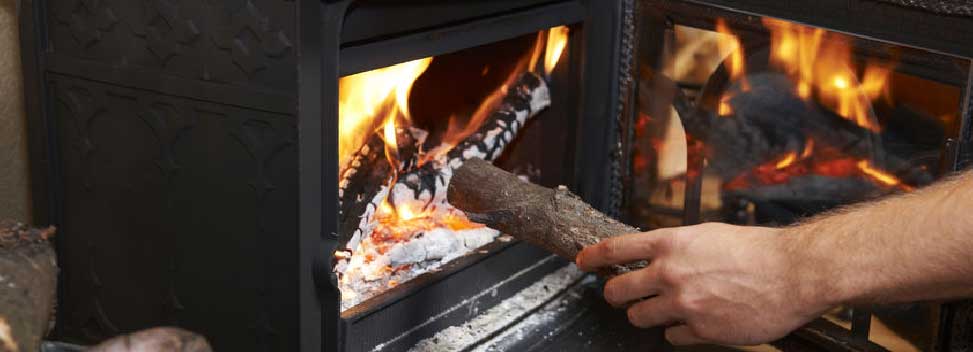Wood burning heaters and stove warranty
Written by Nick Grant
10 Nov 2021
5 min read

As the nights start to get darker and the weather gets colder, it might be time to fire up the heating. For some properties, that means buying in a load of seasoned logs, getting the chimney swept, and firing up the log burner.
Log burners are becoming popular in the UK with around 200,000 new units installed in UK homes every year and sales rising by around 40%. More than 1 million UK households now have a log burner, and for holiday home owners they’re seen as an attractive feature and a unique selling point that clients love. After all, who doesn’t dream of sitting in front of a log fire on a chilly autumn evening?1
However, log burners could have an effect on your insurance, primarily because any open fire (even one contained in an enclosed burner) increases the risk of a house fire. Insurance companies regard them as a perceived ‘dangerous element’, so if you do have a wood-burning stove or log burner, you may want to make sure that it’s not only fitted correctly, but that it’s properly certified too to help obtain suitable cover for your property.
Our holiday home insurance takes into account the rising number of properties with wood burning stoves fitted, so to help ensure you get coverage to meet your needs and with the aim that your premiums are not adversely affected by fitting a log burner, we’ve made clarifications to our warranty.
Any wood burning heaters or stoves should be installed at the premises in accordance with the manufacturer’s instructions. To ensure your insurance isn’t invalidated by fitting a log burner, your holiday home policy may also require that all chimneys and flue pipes are free from contact with any combustible materials or elements of the construction.
How to make your log burner safer
To minimise the risk of a fire, there are things you can do to make your log burner safer.- To comply with your holiday home insurance policy, especially in older properties, it’s recommended that chimney stacks and flues are lined with a non-combustible material to minimise the risk of fire.
- Consider having your chimney swept regularly. Not only does this minimise the risk of a chimney fire, but it could also prevents dangerous carbon monoxide and carbon dioxide build-ups. You’ll also find that a dirty chimney tends to smell quite strongly, especially during warmer weather, which can make your holiday home a lot less appealing to visitors!
- Think about minimising the amount of wood you keep next to the fire, and if possible keep it in a container away from the sides of the burner. While having a picturesque pile of logs next to your burner may look great, it can be a serious fire hazard.
- If you’re planning to have a new log burner installed, consider making sure it’s done by a professional who can give your fire a full safety certification. This can also ensure that your stove is as efficient as possible, reducing the amount of wood you need to burn to heat the room. You should have your log-burning stove inspected once a year by a professional chimney sweep or log-burner specialist to prevent any build-up of ash or creosote in the burner, flue or chimney.
- A heat shield behind the stove can prevent damage to the wall through constant exposure to heat. Make sure that your burner is on a non-combustible surface such as a stone, brick or tile floor that extends around and in front of the fire too. This can ensure that any embers or sparks fall onto a surface that won’t ignite, rather than a flammable carpet or rug.
- Installing carbon monoxide detectors that can alert you if there is a build-up of the gas.
- Check that the local wildlife hasn’t decided to make your chimney their home! Bird nests are a common cause of chimney fires, and blockages caused by nests can also cause smoke to accumulate and be forced back into the room.